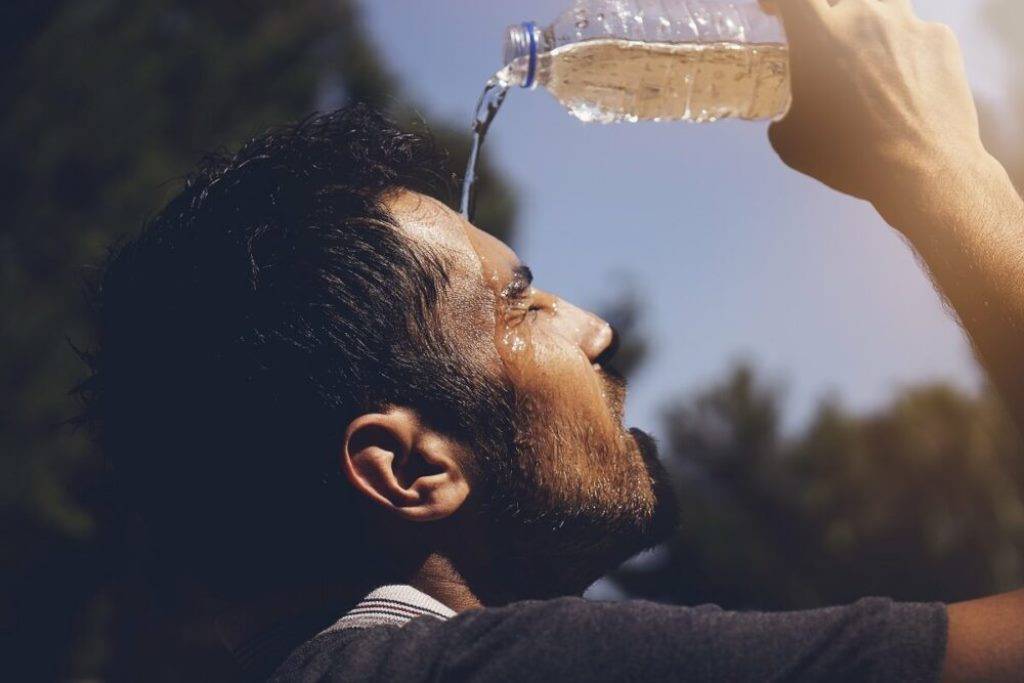
Dehydration occurs when your body does not have as much water as it actually needs. Without sufficient water, your body will not be able to work properly. A person can have mild, moderate and sometimes severe dehydration depending upon how much liquid is missing from his or her body.
Causes of dehydration
It is quite normal to lose water from the body daily due to sweating, peeing, breathing, pooping, and tears or saliva. Generally, people replace the lost water by drinking more fluids and consuming foods that contain water. But if you lose too much water or don’t drink and eat enough then you will surely get dehydrated.
A person can lose more water from the body due to the following reasons:
-
Fever
-
Diarrhea
-
Vomiting
-
Excessive sweating
Peeing a lot (Diabetes and some medications like water pills or diuretics can make you pee more often).
Symptoms of Dehydration
Signs/symptoms of mild or moderate dehydration are:
-
Thirst or throat dryness
-
Dry/sticky mouth
-
Headache
-
Dark yellow pee
-
Not peeing enough
-
Dry skin
-
Muscle cramps
Signs of severe dehydration are:
-
Very dry skin
-
Feeling dizzy
-
Not peeing/having dark yellow pee
-
Rapid breathing
-
Rapid heartbeat
-
Sunken eyes
-
Lack of energy, Sleepiness, irritability
-
Fainting
The symptoms for infants and young children may be different than those of adults in the following ways:
-
Dry mouth & tongue
-
No tears when crying
-
Dry diapers for 3 hours
-
Sunken eyes or cheeks
-
Lack of energy or restlessness
It is important to mention that severe dehydration is a medical emergency and it must be treated without delay.
Who’s at Risk?
Although anybody can get dehydrated, the risks are higher for some people and they are:
-
Infants and kids are the ones who are most likely to have diarrhea & vomiting and in this way, they lose much water from high fever. The infants are not able to tell you that they are thirsty hence parents need to be extra careful.
-
Old people also have less water in their bodies and many times they don’t realize that they are thirsty.
-
People who are unwell due to a cold or sore throat might not want to eat or drink.
-
People with a chronic disease like type 2 diabetes can urinate a lot if the disease is not under control. They may also take medicines like water pills, which make them go for peeing more often.
-
People who have to work in hot, as well as humid weather, sometimes are not able to cool down effectively as their sweat doesn’t evaporate. This may lead to a higher body temperature & need for more water.
Diagnosis
A physician will use physical as well as mental tests to diagnose dehydration. A person having symptoms like disorientation, rapid heartbeat, low blood pressure, lack of sweat, fever and, inelastic skin will generally be considered dehydrated.
Blood tests are often done to check kidney function and levels of sodium, potassium, and another electrolyte. Electrolytes are chemicals that control hydration in the body and are important for nerve and muscle function. A urine analysis will give useful information to help diagnose dehydration. The pee of a person who is dehydrated will be darker in color and more concentrated containing a certain level of compounds known as ketones.
In order to identify dehydration in babies, doctors generally check for a sunken soft spot on their skull. They may also search for a loss of sweat and certain muscle tone characteristics.
Treatment for dehydration
The best way to treat dehydration is by refilling the fluid level in the body. This can be done by drinking clear fluids like water, clear broths, ice pops or frozen water, or sports drinks. But a few dehydration patients may require intravenous liquids in order to rehydrate. Those who are dehydrated must avoid drinks that contain caffeine such as tea, coffee, and sodas.
And if the condition seems to be serious then it is better to consult a doctor.
Prevention
Prevention is better than cure. Consuming lots of fluids and foods that contain high water content like watermelon, cucumber etc. Also people should be careful about doing activities in extreme heat or during hottest part of the day. Those who do regular exercise must give replenishing fluids a priority. As the elderly and very young are high risk of being dehydrated, special attention need to be given to them to ensure they are getting enough fluids.
Hoping that this summer you will not let your body get dehydrated!!!!









